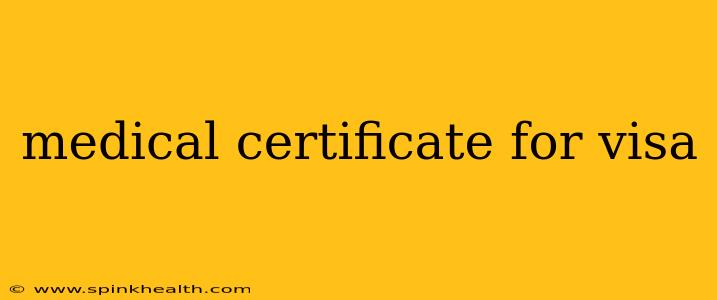Navigating the Maze: Your Guide to Medical Certificates for Visas
The world is shrinking, and with it, the desire to explore new cultures and opportunities. Applying for a visa, however, often involves navigating a complex web of requirements. One such hurdle is frequently the medical certificate – a seemingly simple document that can unexpectedly become a significant obstacle if not properly understood and obtained. This comprehensive guide will unravel the mysteries surrounding medical certificates for visas, providing you with the information you need to navigate this process smoothly.
Imagine this: you've meticulously planned your dream trip, secured your flight tickets, and completed your visa application. Then, bam! You're hit with the medical certificate requirement. Panic sets in. What exactly is this document, and how do you obtain one? Let's dive in.
What is a Medical Certificate for a Visa?
A medical certificate for a visa is a formal document issued by a licensed medical practitioner, verifying your health status. It's essentially a health check-up report specifically tailored for visa application purposes. The specific requirements vary considerably depending on the country you are applying to, the type of visa you are seeking, and your individual circumstances. Some countries require only a basic check, while others might request more extensive examinations, including blood tests, chest X-rays, and even mental health evaluations.
What tests are typically required for a medical certificate?
This is where things get specific, and unfortunately, there's no one-size-fits-all answer. The tests required vary widely, from country to country and even visa type to visa type. Some countries might only require a basic physical examination, checking your vital signs, height, weight, and general health. Others, particularly for long-term stays or work visas, will insist on a much more extensive examination, including:
- Blood tests: To screen for infectious diseases such as HIV, Hepatitis B and C, syphilis, and tuberculosis.
- Chest X-ray: To check for tuberculosis.
- Urine test: Sometimes included as a general health check.
- Other specialized tests: Depending on your destination and visa type, further specialized tests might be required.
Where can I get a medical certificate for a visa?
You'll need to find a panel physician or a medical professional authorized by the embassy or consulate of the country you're applying to. Do not simply go to your family doctor; the embassy's list of approved physicians ensures compliance with their specific requirements and standards. These approved clinics will be familiar with the precise format and content required by the visa authorities. This detail is crucial; using an unauthorized physician could delay or even invalidate your application.
How much does a medical certificate for a visa cost?
The cost of a medical certificate varies significantly. It depends on the country, the specific tests required, and the clinic you choose. It's essential to contact the clinic directly or check the embassy's website for an estimated cost before your appointment. Budget for this expense as part of your overall visa application process.
How long is a medical certificate valid for?
The validity period of your medical certificate is determined by the embassy or consulate. It’s commonly valid for only a short period, often ranging from a few weeks to a few months. It is imperative to carefully check the specific guidelines provided by the relevant embassy or consulate. Obtaining the certificate too far in advance of your application could mean it expires before your visa is processed, leaving you needing to repeat the process.
Can I get my medical certificate at any clinic or doctor's office?
Absolutely not. Only clinics or doctors specifically approved by the embassy or consulate of the country to which you're applying can issue a valid medical certificate. Using an unapproved provider will inevitably result in your application being rejected. This is non-negotiable. Always, always, check the official government website for the list of approved medical practitioners.
The journey to obtaining a medical certificate for your visa might seem daunting, but with careful planning and the right information, it becomes a manageable step in your overall process. Remember that thorough preparation and adherence to the specific guidelines from the relevant embassy or consulate are key to a successful visa application. Good luck with your travels!

